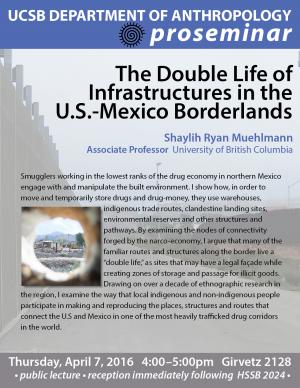Event Date:
Event Location:
- Girvetz 2128
Related Link:
The public talk will be in Girvetz 2128 from 4:00-5:00pm with the reception in HSSB 2024
Shaylih Muehlmann is Canada Research Chair in Language, Culture and the Environment and Associate Professor in the Department of Anthropology at the University of British Columbia. Dr. Shaylih Muehlmann has done her ethnographic fieldwork in the former delta of the Colorado River in northern Mexico. In her first book, Where the River Ends: Contested Indigeneity in the Mexican Colorado Delta (Duke University Press, 2013), Dr. Muehlmann analyzed how local indigenous people have experienced and confronted the state restriction of their fishing at the end of the Colorado. Dr. Muehlmann’s second book When I Wear My Alligator Boots: Narco-Culture in the U.S.-Mexico Borderlands (University of California Press, 2013), examines the effects of the “war on drugs” in the experiences, aspirations and cultural practices of those men and women working at, and affected by, the lowest levels of the trade.




